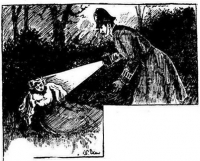Strachur Manse
In his 1897 book entitled ‘The Haunted Homes and Family Traditions of Great Britain’, John Ingram gives the story of a haunt like experience at the Manse in Strachur.
Although the name of the person chiefly concerned in the following narrative is concealed under the initial “S,” the reference to the house where he had his remarkable vision, and the fact that it was then occupied by a relative of the gallant Captain, will afford sufficient means of identification to the curious. Premising this, it will now suffice to say that some few years ago Captain S was spending a single night in the Manse of Strachur, in Argyleshire. This residence was then in the occupation of some relations of the Captain, and, so far as is known, had not at that time the reputation of being haunted.
Soon after the weary guest had retired to rest, the curtains of the bed were opened and somebody looked in upon him. Supposing it to be some inmate of the house who was not aware that the bed was occupied, the Captain took no notice of the circumstance till, it being two or three times repeated, he at length said, “What do you want ? Why do you disturb me in this manner?”
“I come,” replied a voice, “to tell you that this day twelvemonth you will be with your father.”
After this Captain S was no more disturbed. In the morning he related the circumstance to his host, but, being an entire disbeliever in all spiritual phenomena, without attaching any importance to the warning.
In the natural course of events, and quite irrespective of this visitation, on that day twelvemonth he was again at the Manse of Strachur, on his way to the north, for which purpose it was necessary that he should cross the ferry of Craigie. The day was, however, so exceedingly stormy, that his friend begged him not to go; but he pleaded his business, adding that he was determined not to be withheld from his intention by the ghost, and although the minister delayed his departure by engaging him in a game of backgammon, he at length started up, declaring he could stay no longer. They therefore proceeded to the water, but found the boat was moored to the side of the lake, and the boatman assured them that it would be impossible to cross. Captain S , however, insisted, and as the old man was firm in his refusal, he became somewhat irritated, and laid his cane lightly across his shoulders. “It ill becomes you, Sir,” said the ferryman, “to strike an old man like me; but since you will have your way, you must. I cannot go with you, but my son will; but you will never reach the other side, he will be drowned, and vou too.”
The boat was then set afloat, and Captain S, together with his horse and servant, and the ferryman’s son, embarked in it. The distance was not great, but the storm was tremendous; and having, with great difficulty, got half way across the lake, it was found impossible to proceed. The danger of tacking was of course considerable; but,
since they could not advance, there was no alternative but to turn back, and it was resolved to attempt it. The manoeuvre, however, failed, the boat capsized, and they were all precipitated into the water.
“You keep hold of the horse, I can swim,” said Captain S to his servant, when he saw what was about to happen.
Being an excellent swimmer, and the distance from the shore inconsiderable, he hoped to save himself, but he hod on a heavy topcoat, with boots and spurs. The coat he contrived to take off in the water, and then struck out with confidence; but, alas! the coat had got entangled with one of the spurs, and as he swam it clung to him, getting heavier and heavier as it became saturated with water, even dragging him beneath the stream. He, however, reached the shore, where his anxious friend still stood watching the event, and as the latter bent over him, he was just able to make a gesture with his hand, which seemed to say, “You see, it was to be!” and then expired.
The boatman was also drowned, but, by the aid of the horse, the servant escaped.



Recent Comments